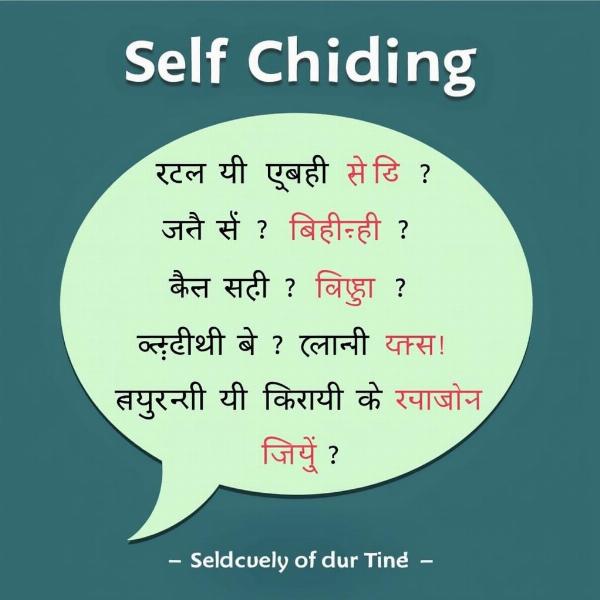“Silly me!” is an expression we often use to lightly chide ourselves for a minor mistake or oversight. But what does it mean in Hindi, and how can you use it correctly? This article explores the nuances of “silly me” in Hindi, providing various translations and explaining their cultural context. We’ll also cover related expressions and provide examples to help you integrate them seamlessly into your Hindi vocabulary.
Decoding “Silly Me” in Hindi
There isn’t a single perfect translation for “silly me” in Hindi. The best choice depends on the specific context and the level of informality. Here are a few common options:
- बेवकूफ़ मैं (Bevakoof main): This is a literal translation using “bevakoof” for “silly” and “main” for “me.” It’s a stronger and more direct way of calling oneself silly.
- मूर्ख मैं (Moorkh main): Similar to “bevakoof main,” this translation uses “moorkh,” another word for “silly” or “foolish.” It carries a slightly more formal tone.
- अरे यार, मेरी गलती (Are yaar, meri galti): This translates to “Oh dear, my mistake.” It’s a more common and less harsh way of expressing self-chiding. “Yaar” is a colloquial term often used among friends.
- हाय राम, मेरी भूल (Hai Ram, meri bhool): This translates to “Oh God, my mistake.” It expresses mild frustration and regret. “Hai Ram” is an exclamation invoking Ram, a Hindu deity.
- कितना बेवकूफ़ हूँ मैं (Kitna bevakoof hun main): This translates to “How silly I am!” It emphasizes the degree of silliness.
Choosing the Right Expression
The cultural context plays a significant role in choosing the right expression. While “bevakoof” and “moorkh” accurately translate to “silly,” they can be perceived as slightly harsh depending on the situation. In informal settings among friends, “are yaar, meri galti” is more appropriate. In more formal situations or with elders, “hai Ram, meri bhool” might be a better option.
Related Expressions in Hindi
Hindi offers a rich variety of expressions to convey similar sentiments. Here are a few examples:
- उफ़्फ, मेरी गलती (Uff, meri galti): This expresses exasperation at one’s own mistake.
- चूक गई मैं (Chook gayi main): This translates to “I missed it” or “I made a mistake.” It’s more commonly used by women.
 Related Hindi Expressions for Silly Me
Related Hindi Expressions for Silly Me
Examples of “Silly Me” in Conversation
Here are a few examples to illustrate how these expressions are used in everyday conversations:
- Scenario: You forget your keys at home.
- Hindi: अरे यार, मेरी गलती! चाबी घर पर ही भूल गया। (Are yaar, meri galti! Chaabi ghar par hi bhul gaya.)
- English: Oh dear, my mistake! I forgot the keys at home.
- Scenario: You realize you made a simple error in a calculation.
- Hindi: कितना बेवकूफ़ हूँ मैं! ये गलती कैसे हो गई? (Kitna bevakoof hun main! Yeh galti kaise ho gayi?)
- English: How silly of me! How could I make this mistake?
Silly Me and Cultural Nuances
While self-deprecating humor is common in many cultures, understanding the nuances in Hindi is important. Using a harsher term like “bevakoof” in a formal setting could be considered inappropriate. The context and your relationship with the person you’re speaking to will guide your choice of words.
Conclusion
“Silly me” in Hindi can be expressed in several ways, each with its own nuances and cultural context. Choosing the right expression depends on the situation and your relationship with the other person. By understanding these nuances, you can communicate more effectively and avoid any unintentional misinterpretations. Remember to choose the expression that feels most natural and appropriate for the specific context.
FAQ
- What is the most common way to say “silly me” in Hindi? “Are yaar, meri galti” is a common and generally safe option in informal settings.
- Is it rude to call yourself “bevakoof” in Hindi? It can be perceived as harsh, especially in formal settings or with elders.
- Are there gender-specific ways to say “silly me” in Hindi? While not strictly gender-specific, expressions like “chook gayi main” are more commonly used by women.
- How can I learn more Hindi expressions? Immersing yourself in Hindi media, talking to native speakers, and using language learning resources can expand your vocabulary.
- What is the meaning of “yaar” in Hindi? “Yaar” is a colloquial term often used among friends, similar to “dude” or “pal” in English.
- Can I use “Hai Ram” even if I’m not religious? Yes, it’s a common expression of mild frustration, even among those who aren’t particularly religious.
- Is there a formal way to express “silly me” in Hindi? “Hai Ram, meri bhool” is a more formal and respectful option.
Meaning-Hindi.in is your one-stop solution for all your Hindi translation needs. We offer a wide range of professional translation services, including business and commercial document translation, certified and legal document translation, technical and user manual translation, website and localization translation, educational and academic document translation, express translation, and specialized translation. We pride ourselves on delivering accurate, culturally sensitive translations that meet the highest quality standards. Need help with your next translation project? Contact us today at [email protected] or call us at +91 11-4502-7584. Meaning-Hindi.in is committed to bridging language barriers and facilitating seamless communication.